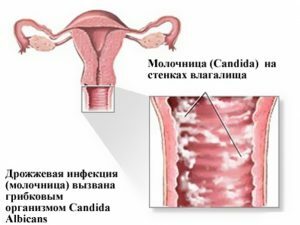Contrary to popular belief that bearing a child adorns a woman, this process activates many chronic processes in the body of a future mother. Some of them can adversely affect the health of the future baby. For example, a common disease - thrush during pregnancy, what is dangerous for the fetus given pathology? Most often, the future mother will find out about her illness already in the women's consultation, since most often it is almost asymptomatic. For successful treatment of this unpleasant disease, a pregnant woman should clearly understand the characteristics of changes in the flora of the vagina.
What causes thrush
It should be noted that the concept of thrush is used in private conversations among patients. It is due to the fact that with this pathology, the main symptom is the discharge, appearance similar to sour milk.
Specialists call this disease candidiasis, since most cases of infection are caused by pathological fungi of the genus Candida. For a long time, yeast infections were referred to sexually transmitted diseases, such as gonorrhea or trichomoniasis.
However, recent studies have not confirmed this theory, since pathological fungi were found on examination in only 8% of men who had sex with women who were sick. Therefore, candidiasis is considered an exclusively female problem.

Most experts are inclined to believe that the cause of thrush during pregnancy is the ingestion of a certain number of candida fungi from the intestine of a woman in the vagina. In a normal state, the microflora of the vagina copes with this problem, however, in a pregnant woman immunity is reduced, and most bacteria of the intimate mucosa do not have time to restore their bactericidal function.
In addition to this main reason, the emergence of thrush can lead to the independent use of various hormonal drugs, excessive amounts of carbohydrates in the daily diet of a woman, nervous overexertion. Often this pathology can be detected in patients with hormonal disorders and diabetes mellitus.
In 75% of cases, candidiasis affects the vagina of a pregnant woman in the last trimester. A similar condition is associated with an increase in the content of oxytocin and prolactin in the blood. However, in the early stages of bearing a fetus, a similar problem may arise.
The main symptoms in a pregnant
External manifestations of the disease directly depend on its shape. Most often in pregnant women, candidiasis is asymptomatic, that is, a future mother is simply a carrier of pathogenic flora. This condition is usually detected at the first visit to a woman's consultation and a laboratory study of vaginal smears.
Under the influence of various factors during pregnancy, the process can become acute. Patients note:
- irritation and pain in the area of the external and internal genital organs;
- abundant discharge with a specific odor;
- edema and flushing of the labia and vagina.
To establish the diagnosis, in addition to laboratory tests, use the colposcopy method. A characteristic picture in this case allows differential diagnosis.
Features of thrush flow in a future mother
 Since fungal inflammation of the vagina occurs when carrying a baby 2 to 3 times more often than in ordinary women, the natural question arises: "What is dangerous for thrush during pregnancy?"
Since fungal inflammation of the vagina occurs when carrying a baby 2 to 3 times more often than in ordinary women, the natural question arises: "What is dangerous for thrush during pregnancy?"
The biggest problem of this pathology is considered to be a high risk of infection of the baby during childbirth. According to various literary data, the probability of infection of the child reaches 70 - 80%.In this case, the usual physiological birth does not differ in the frequency of fungal fetal damage from cesarean section.
Candidiasis in children's bodies is most often confined to the mucosa and umbilical cord of the infant, but in case of deep premature birth, the candidiasis of the newborn can aggravate the child's condition and even lead to postnatal complications.
As already mentioned above, the main cause of thrush in pregnant women is the constant leaps in hormones in the blood, which leads to changes in the microflora of the vagina and infection of the woman. The course of the disease is usually undulating. Symptoms of mucosal irritation and foamy discharge can occur and disappear throughout pregnancy throughout virtually no apparent cause.
Even after the course of therapy, candidiasis can again harass a woman, although in this case it may be an unsystematic form of the disease and can only be manifested in analyzes. In rare cases, when the disease existed in the body of a pregnant woman before conception, chronic candidiasis develops. Such a course of the process is difficult to treat and may exacerbate from time to time.
Than a thrush is dangerous during pregnancy? This disease can be a threat to the mother and her unborn child, therefore, despite the difficulties in diagnosing and prescribing therapy, it is necessary to treat candidiasis of pregnant women.

Treatment of this pathology in women during gestation
Difficulties in treating thrush in pregnant women arise from the fact that you can not use conventional tested drugs because of their adverse effects on the fetus.
Treatment of fungal diseases of female genitalia is usually carried out in a complex manner. Patients are prescribed oral medicines and local specialized drugs. This practice is due to the fact that most of the pathogenic fungi are in the intestine, and the treatment of candidiasis needs to begin with a pregnant woman's gastrointestinal tract.
It is at this point that difficulties arise. Known drugs for the treatment of thrush "Orungala" and "Flukonazola" for several years are banned during pregnancy, since scientists have proven their ability to cause the fetus various malformations. In very rare cases, when the fungal process threatens the health of the mother and baby, these drugs are used one week prior to delivery under the control of laboratory tests.
To avoid this risk, most specialists recommend treating thrush in pregnant women with local medicines. The pharmacy network offers a large number of ointments, creams and candles at any price level.
At the beginning of pregnancy, gynecologists prefer "Pimafucin" and candles with nystatin. For patients who are in the 2nd and 3rd trimester, "Gynofort" or "Isoconoral" is more suitable. Thanks to the success of the leading pharmaceutical campaigns, it was possible in these preparations to achieve a combination of an excellent effect on a woman's fungus flora and complete safety for a future child.
In the last week before the birth of pregnant women with fungal pathology, they are usually put in preparation for this process in the department of pathology, where, among other procedures, the woman is treated with Terzhinan. This remedy among other infections successfully copes with the mushrooms that are in the vagina of the future mother.
Thrush is a pretty nasty and complex disease that can bring a woman big problems. In addition to constant irritation in the perineum, difficulties with daily hygiene, this disease prevents normal sexual life, which often causes neuroses in the fair sex. Especially candidiasis is dangerous in pregnancy, when not only the health of a woman, but also the well-being of a future baby is at stake. The thrush must be treated necessarily, but during the period of bearing the child, one should not engage in self-medication. Acceptance of any medications by a future mother should be constantly monitored by specialists. With the joint efforts of a woman and a doctor, fungal vaginal damage during pregnancy will necessarily be defeated and will not bring any problems to the future baby.

 We recommend reading the article about treatment of thrush during pregnancy with folk remedies. From it you will learn about the causes of the disease, the use of home prescriptions for the treatment of candidiasis, the effectiveness of the baths, rubs, the possibility of douching.
We recommend reading the article about treatment of thrush during pregnancy with folk remedies. From it you will learn about the causes of the disease, the use of home prescriptions for the treatment of candidiasis, the effectiveness of the baths, rubs, the possibility of douching.